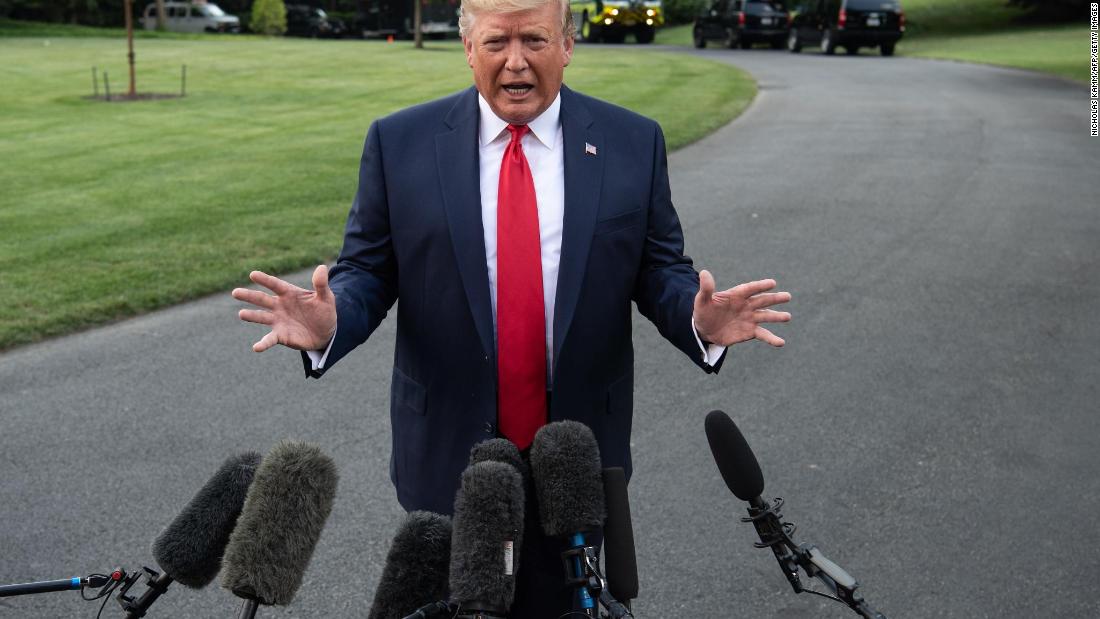The US withdrawal puts an end to a landmark arms control pact that has limited the development of ground-based missiles with a range of 500 to 5,500 kilometers and is sparking fears of a new arms race.
"Russia is solely responsible for the treaty's demise," Secretary of State Mike Pompeo said in a statement Friday announcing the US' formal withdrawal from the Cold-War era nuclear treaty.
Pompeo said, "Russia failed to return to full and verified compliance through the destruction of its noncompliant missile system."
NATO Secretary General Jens Stoltenberg told CNN's Hala Gorani that the treaty's end is a "serious setback."
'A bad day'
"The fact that we don't have the INF Treaty anymore, the fact that the Russians over the years have deployed new missiles, which can reach European cities within minutes, which are hard to detect, are mobile and are nuclear capable, and therefore reduce the threshold of any potential use of nuclear weapons in an armed conflict -- of course that's a bad day for all of us who believe in arms control and stability in Europe," Stoltenberg said.
"At the same time, NATO is there to protect all our allies and we will take the necessary measures to retain credible defense," he added.
The new US missile test, which
CNN reported Thursday, is expected to take place in the next few weeks and will essentially be the Trump administration's answer to Russia's years-long non-compliance with the INF treaty, the senior US defense official said.
A senior administration official told reporters that the US will be testing the cruise missiles that were forbidden by the INF treaty because "Russia cannot maintain military advantage," but claimed that it will take years for the US to deploy those weapons.
Deployment
"We are literally years away before we would be at a point where we would talk about basing of any particular capability. Because of our steadfast adherence to the treaty over 32 years, we are barely, after almost a year, at a point where we are contemplating initial flight tests," explained the senior administration official, noting that the US would only look at deploying conventional weapons, not nuclear weapons.
But the Pentagon said in March that this ground launched missile could be ready for deployment within 18 months. The administration's budget request for fiscal year 2020, released in February, included $96 million for continued research and development on INF range missile systems.
And arms control experts say it's not difficult to convert existing air- or sea-based systems into the ground-based missile the Pentagon plans to test. "It is not a significant engineering task," said Jon Wolfsthal, director of the Nuclear Crisis Group and a former nuclear expert for the National Security Council under the Obama administration. "It's well within the capability of major defense contractors and the army to pull off."
The end of the INF pact leaves the US and Russia with just one nuclear arms agreement, the New START Treaty, which governs strategic nuclear weapons and delivery systems for each side. If New START isn't renewed or extended by 2021, the world's two largest nuclear powers would have no limits on their arsenals for the first time in decades.
President Donald Trump's ambivalent comments about New START and national security advisor John Bolton's well-known dislike for arms control treaties have given rise to deep concern about a new nuclear arms race.
UN Secretary General Antonio Guterres told reporters Thursday that the INF Treaty's expiry means "the world will lose an invaluable brake on nuclear war. This will likely heighten, not reduce, the threat posed by ballistic missiles."
He urged the US and Russia to "urgently seek agreement on a new common path for international arms control."
Retired Gen. Wesley Clark, a former NATO supreme allied commander, said on CNN "New Day" that the termination of the treaty also marks "one more ratchet up on the movement towards a more adversarial relationship with Russia."
But he added that the US "really didn't have a choice" because the treaty wasn't effective.
'A competition with nuclear arms'
"We're going into a new competition, a military competition, including a competition with nuclear arms against development that Russia, and to some extent, China are making," Clark said. "No one wants to do this. It's expensive, it's dangerous, but it's necessary if we're going to maintain our security in an uncertain world."
The Trump administration casts the forthcoming test of the new ground-based missiles as necessary to US national security, even as it seeks to tamp down any suggestion that the US is triggering an arms race, a claim that's met with skepticism in the arms control community.
When asked if the US will commit to maintaining some kind of arms control despite this treaty being defunct, the official largely put the onus on Russia.
"I can't speak for the Russian federation so I can't promise that they will be amenable to additional arms control," the official said. "I can only tell you that the US, from the President on down, is interested in finding an effective arms control solution."
On Friday, Russia said it is inviting the US and NATO to join them in declaring a moratorium on deployment of intermediate-range and shorter-range missiles.
'Not credible'
"We invited the US and other NATO countries to assess the possibility of declaring the same moratorium on deploying intermediate-range and shorter-range equipment as we have, the same moratorium Vladimir Putin declared, saying that Russia will refrain from deploying these systems when we acquire them unless the American equipment is deployed in certain regions," Russian Deputy Foreign Minister Sergei Ryabkov said, Russian state news agency TASS reported.
Stoltenberg on Friday dismissed Russia's offer of a moratorium as "not credible," because Russia has been deploying missiles for years.
"There is zero credibility in offering a moratorium on missiles they are already deploying," he said. "There are no new US missiles, no new NATO missiles in Europe but there are more and more Russian missiles," Stoltenberg said in a press conference at NATO headquarters in Brussels.
International allies, including the United Kingdom, emphasized their support for the US' move to withdraw from the INF treaty.
NATO allies said in a statement that Russia remains in violation of the INF Treaty, "despite years of U.S. and Allied engagement," adding that they fully support the US' decision.
NATO added that over the past six months Russia had a "final opportunity" to honor the treaty but failed.
UK Foreign Secretary Dominic Raab said Russia caused the INF Treaty collapse,
tweeting, "Their contempt for the rules based international system threatens European security."
The senior US defense official said that the US has long had evidence that Russia has developed, tested and fielded "multiple battalions" of non-INF compliant cruise and ballistic missiles. The US believes the deployments are "militarily significant" because the missiles are mobile, allowing Moscow to move them rapidly and making it difficult for the US to track them.
The Russian missiles use solid fuel, which also means they can be readied in a very short time frame to be fired at targets, especially in western Europe.
Alexandra Bell, senior policy director at the non-partisan Center for Arms Control & Non-Proliferation, explains that "with this type of missile there's very short warning, attacks are harder to spot by radar, so it's just more destabilizing. They made the situation in Europe more dangerous."
Russian targets
The Pentagon has been working on the new missile system's very initial phases, which will lead to the first test in the coming weeks, the defense official said. The official emphasized there is no formal program yet to develop the missile, because the INF treaty has been in effect.
The US also has yet to formally discuss and commit to firm basing options, the defense official said. The concept, the official said, would be to position the missiles in militarily advantageous positions from which they could fire past Russian defenses and target ports, military bases or critical infrastructure.
But no NATO member "has said it would be willing to host new US intermediate range missiles," Kingston Reif, director for disarmament and threat reduction policy at the Arms Control Association.
Indeed, several NATO members, including Poland, have made clear that any deployment of the missiles in Europe would have to be approved by all NATO members. Stoltenberg has emphasized that NATO will respond to the end of the INF Treaty as an alliance and would not be amenable to US missile deployments on its border.
"What we will do will be measured, it will be coordinated as a NATO family, no bilateral arrangements, but NATO as an alliance," Stoltenberg said last month. "We will not mirror what Russia is doing, meaning that we will not deploy missiles," the NATO chief said.
CNN's Vasco Cotovio, Laura McMillan and Zahid Mahmood in London contributed to this report.
https://www.cnn.com/2019/08/02/politics/nuclear-treaty-inf-us-withdraws-russia/index.html








